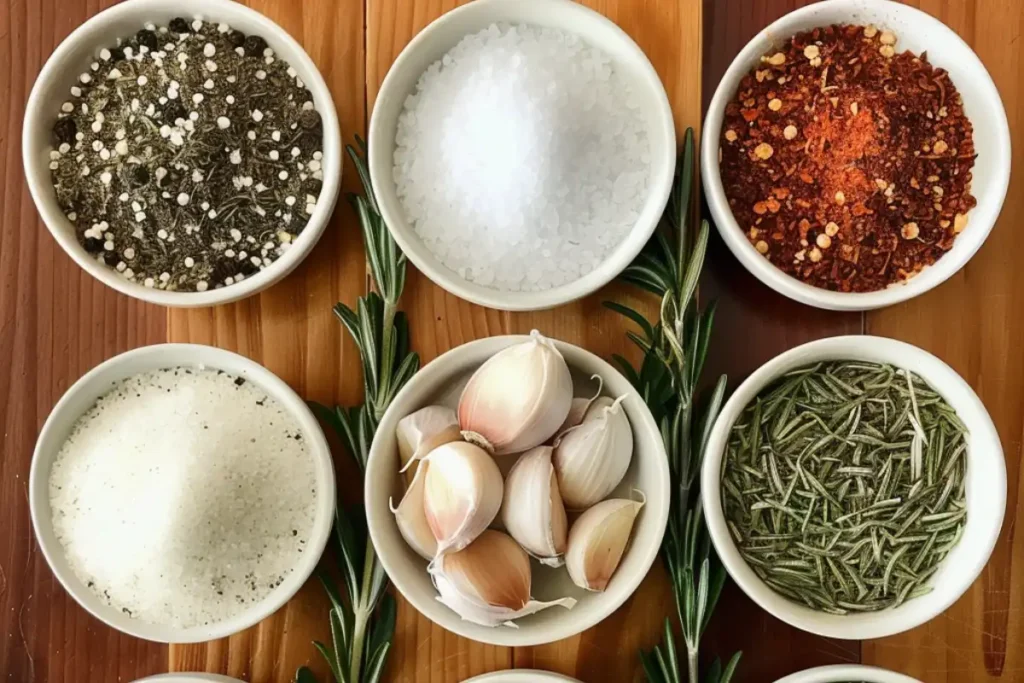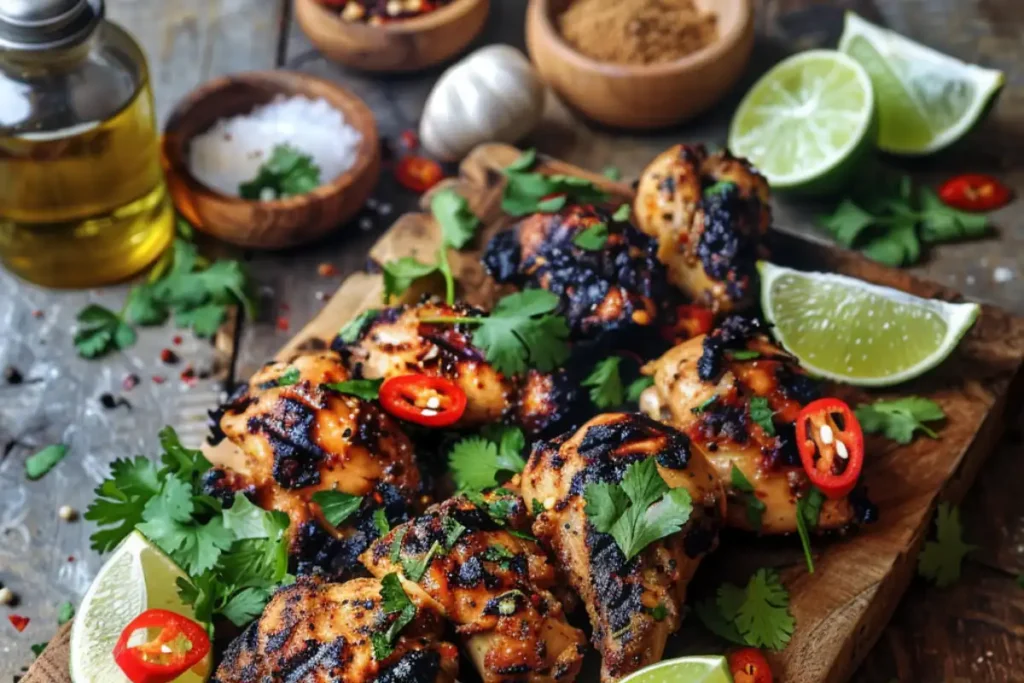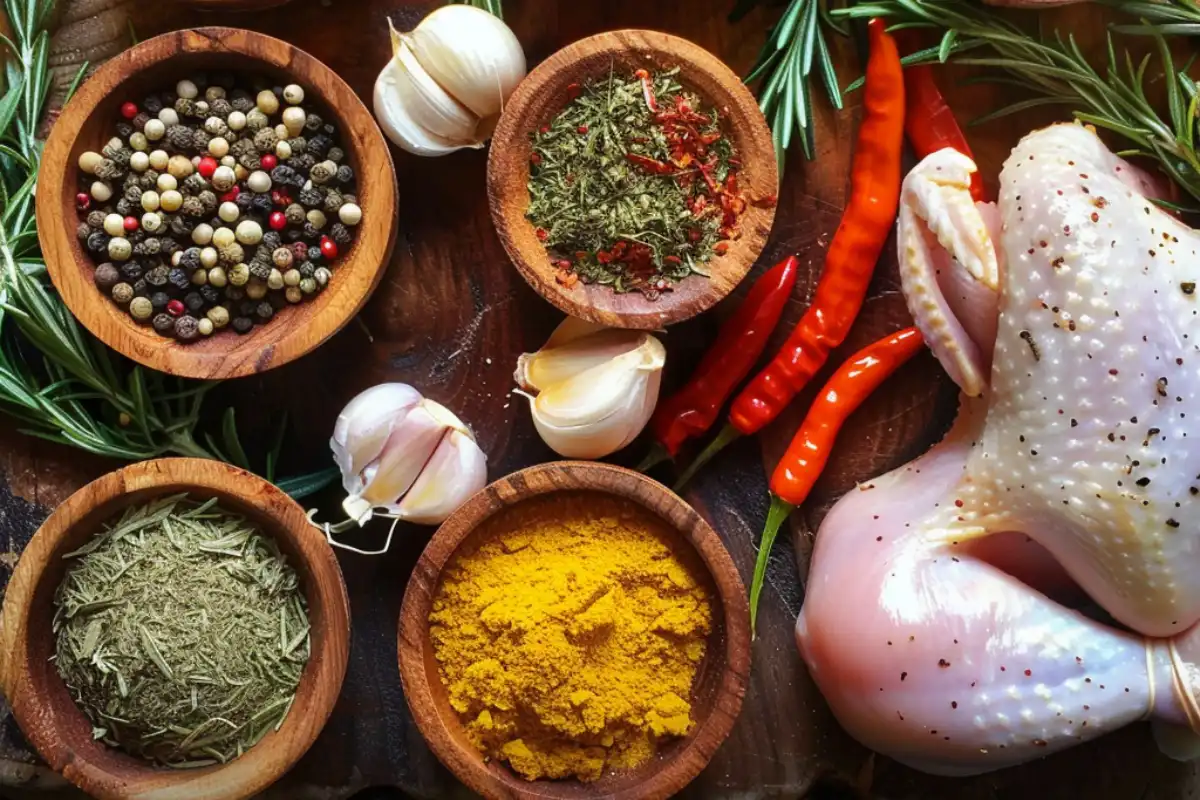Chicken is a staple in kitchens worldwide due to its versatility and mild flavor, which serves as a blank canvas for seasoning. Whether you prefer grilled, roasted, or fried chicken, the right combination of herbs and spices can turn an ordinary dish into something extraordinary. But with so many different spices and seasoning blends available, you might wonder what seasoning goes well with chicken and how to achieve that perfect flavor.
In this comprehensive guide, we will explore the best seasonings and spice blends to pair with chicken, as well as tips on how to use them for maximum flavor. You’ll also find useful answers to frequently asked questions about seasoning chicken.
The Basics of Seasoning Chicken
Why Seasoning is Essential for Chicken
Seasoning is crucial to enhance the natural flavors of chicken. While chicken is delicious on its own, it’s the added layers of seasoning that elevate it from plain to mouthwatering. The right combination of spices not only adds depth but also brings out the richness of the meat. Different herbs and spices can create a variety of flavor profiles, allowing you to experiment with a wide range of cuisines.
Seasoning chicken can be as simple or complex as you like. You can stick with basic salt and pepper, or create intricate blends that involve a mixture of spices, herbs, and even liquids like lemon juice or vinegar. Each seasoning combination offers its own unique characteristics, making chicken dishes adaptable to different tastes and occasions.
For example, you can enhance a roasted chicken by using classic herbs like rosemary and thyme, while grilled chicken takes well to smoky spices like paprika and cumin. Learn more about how various ingredients and seasonings transform simple dishes.
How to Prepare Chicken for Seasoning
Before seasoning your chicken, preparation is essential. First, ensure that your chicken is dry by patting it down with paper towels. This step helps the seasoning stick better to the chicken and allows for even distribution. Whether you’re using a dry rub or marinade, dry chicken helps absorb the flavors more effectively.
Next, consider whether you’ll be using a dry rub, marinade, or a combination of both. Dry rubs are typically applied directly to the meat and are ideal for grilling and roasting. Marinades, on the other hand, involve soaking the chicken in a seasoned liquid mixture for a period of time, which is great for infusing moisture and flavor.
Marinades often contain acidic elements like lemon juice or vinegar, which help tenderize the chicken while adding layers of flavor. For more tips on marinades and seasoning techniques, check out this guide to Hawaiian Garlic Shrimp, which also involves a savory marinade.
Basic Seasonings That Go Well with Chicken
Salt and Pepper: The Essential Duo
Every good seasoning combination begins with salt and pepper. Salt is the most basic yet most important seasoning because it enhances the natural flavors of the chicken. Pepper, on the other hand, adds just the right amount of heat to balance out the flavor.
- Salt: Use kosher or sea salt for best results. These salts are less processed and have larger grains, which allows them to penetrate the chicken more deeply than table salt.
- Pepper: Freshly ground black pepper offers the best flavor and aroma. You can also experiment with white pepper for a milder, slightly earthier flavor.
Garlic and Onion Powder
Garlic powder and onion powder are essential seasonings in most kitchens. These powders are versatile and work well in almost any chicken recipe, from grilled chicken to soups and stews. They add a rich, savory flavor that enhances the taste of the chicken without overpowering it.
- Garlic powder: Adds an earthy and slightly sweet flavor to chicken. It works well in dry rubs and marinades alike.
- Onion powder: Provides a sweet and savory flavor, making it a perfect complement to garlic powder.
These two seasonings form the backbone of many spice rubs and blends, adding depth and richness to chicken dishes.

Paprika: Adding Color and Flavor
Paprika is an essential spice for chicken, not just for its flavor but also for the vibrant color it adds to the dish. There are three main types of paprika:
- Sweet paprika: This adds a mild, sweet flavor without any heat. It’s great for roasted chicken and chicken stews.
- Smoked paprika: Adds a deep, smoky flavor to grilled or roasted chicken, perfect for adding that charred taste without using a smoker.
- Hot paprika: Ideal for those who enjoy a spicy kick, hot paprika enhances the dish with its heat.
Paprika is incredibly versatile and can be used in rubs, marinades, or sprinkled directly on chicken before cooking.
Herbs: Thyme, Rosemary, and Oregano
Herbs are a fantastic way to bring out the natural flavors of chicken. Fresh or dried, herbs provide depth, complexity, and an aromatic quality to the dish.
- Thyme: A fragrant herb that pairs well with garlic and lemon, making it a favorite for roasted chicken.
- Rosemary: With its bold, pine-like flavor, rosemary works best with grilled or roasted chicken.
- Oregano: Often used in Mediterranean and Latin dishes, oregano adds an earthy, slightly bitter flavor to chicken.
These herbs can be used individually or combined in seasoning rubs or marinades for added complexity.
Global Spices and Seasoning Blends for Chicken
Different cuisines around the world use unique blends of spices to season chicken. Let’s take a look at some popular global seasonings that go well with chicken.
Cajun and Creole Seasoning
Cajun and Creole seasonings are spicy blends commonly used in Southern and Creole cuisine. These blends usually contain a mixture of paprika, garlic powder, onion powder, cayenne pepper, and herbs like oregano and thyme. They are ideal for dishes like blackened chicken, grilled chicken, or chicken gumbo.
- Cajun seasoning: Known for its heat and smokiness, Cajun seasoning is a great match for grilled chicken.
- Creole seasoning: Similar to Cajun seasoning but with more herbal notes, Creole seasoning is often used in baked or fried chicken dishes.
For a Southern-inspired dish, try using Cajun seasoning in a Jambalaya recipe. Check out this guide to making a perfect jambalaya seasoning to complement your chicken.
Italian Seasoning Blend
Italian seasoning is a combination of dried herbs, including oregano, basil, thyme, and rosemary. This blend is perfect for chicken dishes like chicken parmesan, chicken piccata, or grilled chicken with a simple lemon and herb marinade.
- Tip: Combine Italian seasoning with garlic, olive oil, and lemon juice for a flavorful marinade that works well for grilling or roasting chicken.
Italian seasoning is versatile and can be used in rubs or marinades to add a Mediterranean flair to your dish.
Indian Spices: Turmeric, Cumin, and Garam Masala
Indian cuisine uses a variety of spices to flavor chicken, with turmeric, cumin, and garam masala being some of the most commonly used.
- Turmeric: Adds a warm, earthy flavor and a vibrant yellow color to chicken dishes like curries.
- Cumin: Provides a smoky, nutty flavor that’s perfect for grilled or roasted chicken.
- Garam masala: A complex blend of spices, including cinnamon, cloves, and cardamom, that adds warmth and depth to chicken dishes like chicken tikka masala or curry.
These spices can be used in marinades or rubs to infuse Indian flavors into your chicken dishes.
Middle Eastern Spices: Sumac, Za’atar, and Cumin
Middle Eastern cuisine offers some of the most aromatic and flavorful spice blends for chicken. Sumac, za’atar, and cumin are popular spices that create a unique flavor profile for grilled or roasted chicken.
- Sumac: Adds a tangy, lemon-like flavor to chicken dishes.
- Za’atar: A mix of sesame seeds, sumac, and thyme, za’atar is perfect for rubbing onto chicken before grilling.
- Cumin: A key ingredient in Middle Eastern cuisine, cumin adds warmth and depth to chicken dishes.
These spices work well in both dry rubs and marinades, making them perfect for grilled or baked chicken.
Customizing Your Own Chicken Seasoning
Building Your Own Spice Rub for Chicken
Creating your own spice rub allows you to control the flavors and make something tailored to your taste. Here’s a simple guide to building your own rub:
- Start with a base: Salt, pepper, and garlic powder form the foundation.
- Add herbs: Use thyme, rosemary, or oregano to give the chicken an aromatic flavor.
- Incorporate heat: Cayenne pepper, chili powder, or smoked paprika can add a spicy kick.
- Balance with warmth: Cumin and coriander add depth and complexity.
You can adjust the proportions to create a seasoning blend that suits your personal taste. For more ideas, check out this simple Hawaiian Garlic Shrimp seasoning recipe.
Seasoning for Specific Cooking Methods
Different cooking methods bring out different flavors in chicken, and your seasoning should reflect this.
- Grilling: Use dry rubs with paprika, cumin, and chili powder to create a smoky, charred flavor.
- Roasting: Herb-based rubs with rosemary, thyme, and olive oil help create a crispy, flavorful crust when roasting chicken.
- Frying: Garlic powder, paprika, and cayenne add flavor to the crispy coating of fried chicken.

By adjusting your seasoning based on the cooking method, you’ll get the best results from your chicken.
Frequently Asked Questions (FAQs)
What is the best all-purpose seasoning for chicken?
- An all-purpose chicken seasoning typically includes salt, pepper, garlic powder, and paprika. This simple yet effective combination works well with any cooking method and enhances the natural flavor of the chicken.
Can I use the same seasoning for baked and grilled chicken?
- Yes, but some seasonings intensify with heat. For example, cayenne pepper or chili powder can become more pronounced when grilled. Adjust the amount based on the cooking method to avoid overpowering the chicken.
Should I season chicken before or after cooking?
- It’s best to season chicken before cooking to allow the flavors to penetrate the meat. However, you can also add seasoning after cooking to enhance the flavor further.
Conclusion: Elevating Your Chicken with Seasoning
Seasoning is what turns simple chicken into something special. Whether you’re keeping it simple with salt and pepper or exploring bold global flavors with Cajun or Middle Eastern spices, the right seasoning can transform your chicken dishes into culinary masterpieces.
Don’t be afraid to experiment with different seasonings and cooking methods to find what works best for you. Whether you’re grilling, roasting, or frying, chicken is the perfect canvas for endless flavor possibilities.
Check out this Chicken Katsu Ramen recipe for another example of how bold seasonings can enhance a simple dish.


1 thought on “What Seasoning Goes Well with Chicken?”